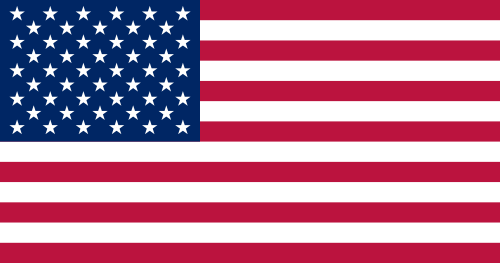The United States of America (USA), commonly known as the United States (U.S. or US) or America, is a country primarily located in North America. It comprises 50 states, a federal district, five major self-governing territories, and various possessions. With a rich history, diverse culture, and significant global influence, the USA is a complex and multifaceted nation.
List of public and federal holidays in the United States of America for the year 2024
- New Year’s Day: January 01, Monday, 2024
- Martin Luther King Jr. Day: January 15, Monday, 2024
- Presidents’ Day: February 19, Monday, 2024
- Memorial Day: April 22, Monday, 2024
- Independence Day: July 04, Thursday, 2024
- Labor Day: September 02, Monday, 2024
- Columbus Day: October 14, Monday, 2024
- Veterans Day: November 11, Monday, 2024
- Thanksgiving Day: November 28, Thursday, 2024
- Christmas Day: December 25, Wednesday, 2024
These holidays are observed nationwide, though additional holidays and observances may exist at the state or local level
Country Profile USA (United States of America)
- Population: 317.6 million (UN, 2010)
- Capital: Washington DC
- Largest city: New York City
- Area: 9.8 million sq km (3.8 million sq miles)
- Internet domain: .us
- International dialling code: +1

Summary of important facts about the United States:
Geography
The USA is the world’s third- or fourth-largest country by total area, covering approximately 3.8 million square miles. It has diverse landscapes ranging from the Arctic wilderness of Alaska, the plains of the Midwest, the Rocky Mountains, the beaches of Florida, to the sunny shores of California. The country has a varied climate and is home to a wide array of flora and fauna.
Population and Demographics
The United States is one of the world’s most ethnically diverse and multicultural nations, largely due to large-scale immigration from many countries. The U.S. population is over 330 million, and while English is the de facto national language, there are hundreds of languages spoken across the country. The U.S. is also religiously diverse, with freedom of religion being a constitutional right.
History
The history of the United States began with the arrival of Native Americans in North America around 15,000 BC. European colonization began in the 16th century. The United States emerged from the thirteen British colonies established along the East Coast. Numerous disputes between Great Britain and the colonies led to the American Revolutionary War lasting between 1775 and 1783, leading to independence. The country’s significant events include the Civil War, industrialization, the Great Depression, World War II, the Civil Rights Movement, and the Cold War.

Government and Politics
The U.S. is the world’s oldest surviving federation and a representative democracy. The federal government is divided into three branches: legislative (the bicameral Congress), executive (president), and judicial (Supreme Court). The president is the head of state and government. The United States is a founding member of the United Nations, World Bank, International Monetary Fund, and other international organizations.
Economy
The United States has a mixed economy and has maintained a stable overall GDP growth rate, a moderate unemployment rate, and high levels of research and capital investment. It is the world’s largest economy by nominal GDP and net wealth and the second-largest by purchasing power parity. The U.S. dollar is the world’s primary reserve currency. Major industries include technology, petroleum, steel, motor vehicles, aerospace, telecommunications, chemicals, electronics, food processing, consumer goods, lumber, and mining.
Education and Health
The U.S. has many competitive private and public institutions of higher education. It has a higher percentage of tertiary-degree holders than any other country. The United States ranks near the middle in terms of healthcare performance compared to other high-income countries, and health care is provided through a combination of public and private funding.
Culture
American culture is a Western culture, influenced by many different cultures and ethnicities. Key cultural icons include Hollywood, music, sports, historical personalities, and technological innovations. American cuisine is similarly diverse, reflecting the country’s melting pot of cultures.
Science and Technology
The U.S. has been a leader in scientific research and technological innovation since the late 19th century. In the 21st century, approximately two-thirds of research and development funding comes from the private sector. The United States leads the world in scientific research papers and impact factor.
Military
The United States has the world’s largest military budget and is the world’s foremost military power. It is an influential nation in military operations and is a permanent member of the United Nations Security Council.
Environmental Issues
The United States has a diverse environment and is home to many species and ecosystems. However, it faces various environmental issues, such as climate change, pollution, and habitat destruction. There are numerous laws and regulations aimed at protecting the environment, and the country has made strides in renewable energy and conservation.
Global Influence and Diplomacy
The United States is a global leader and has a significant cultural, political, and economic influence on the world. It is a founding member of the United Nations, NATO, WTO, G7, and other international bodies. U.S. foreign policy has varied throughout its history, from isolationism to internationalism.
Conclusion
The United States of America is a country with a deep and complex history, a diverse population, and significant global influence. From its political foundations to its cultural contributions, the U.S. continues to play a major role in world affairs. Its economy, military, and technological prowess make it a central figure on the global stage, while its challenges and diverse population shape its domestic landscape. As it moves forward, the USA continues to be a nation of significant interest and importance on the world stage.
